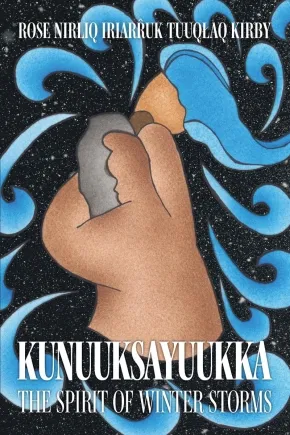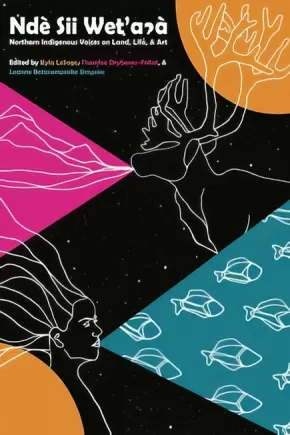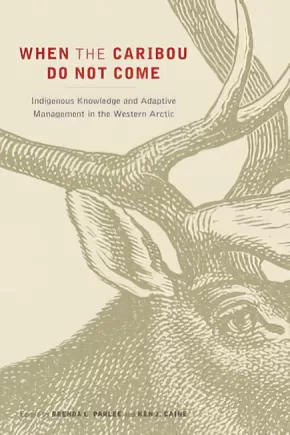Inuvialuit (Mackenzie Inuit)
Synopsis:
Kunuuksayuukka: The Spirit of Winter Storms is a story of Inuvialuk (Western Arctic Inuk) Elder Rose Kirby's early life, beginning from her vibrant traditional life on the land, to being taken away on a "ship of tears" to residential school in Aktlarvik (Aklavik), before moving around different DEW Line sites following her father Joseph Saraana Thrasher's work. Known for her powerful memory and storytelling skills, Rose vividly recounts stories from her childhood and even infancy.
Kunuuksayuukka: The Spirit of Winter Storms honours the important lessons that Rose has learned from her Elders and family, through watching how they interacted with one another, as well as with the larger natural world. Rose uses Kunuuksayuukka-the spirit of winter storms-and its slow disappearance from her life, to describe her own transition from traditional, nomadic life on the land to moving into housing settlements created by tan'ngit (white people).
Through almost 300 pages, Rose's book weaves through candid stories of human relationships, loss, love and care for one another, humour, pain, strength, and resilience. Most importantly, it is a heartfelt tribute to Inuvialuit culture, language, history, life, and experiences-all through the eyes of an Inuvialuk who has learned to move with the changing world as she grew up. This book is a must-read for anyone who wants to learn about how Inuvialuit lived long ago.
Additional Information
6.00" x 9.00" | 25 b&w photographs | Paperback
Synopsis:
Ndè Sii Wet'aà: Northern Indigenous Voices on Land, Life, & Art is a collection of essays, interviews, short stories and poetry written by emerging and established northern Indigenous writers and artists. Centred on land, cultural practice and northern life, this ground-breaking collection shares wealth of Dene (Gwichʼin, Sahtú, Dehcho, Tłı̨chǫ, Saysi, Kaska, Dënesuiné, W?ìl?ìdeh ) Inuit, Alutiiq, Inuvialuit, Métis, Nêhiyawak (Cree), Northern Tutchone, and Tanana Athabascan creative brilliance. Ndè Sii Wet'aà holds up the voices of women and Two Spirit and Queer writers to create a chorus of voices reflecting a deep love of Indigenous cultures, languages, homelands and the north. The book includes a series of pieces and interviews from established northern artists and musicians including Leela Gilday, Randy Baillargeon (lead singer for the W?ìl?ìdeh Drummers), Inuit sisters, song-writers and throat singers Tiffany Ayalik and Inuksuk Mackay of Piqsiq, Two Spirit Vuntut Gwitchin visual artist Jeneen Frei Njootli, Nunavik singer-songwriters Elisapie and Beatrice Deere and visual artist Camille Georgeson-Usher. Ndè Sii Wet'aà also includes writing from well-known northern writers Siku Allooloo, T'áncháy Redvers (Fireweed), Antione Mountain (From Bear Rock Mountain), Glen Coulthard (Red Skin, White Masks), Catherine Lafferty (Northern Wildflower, Land-Water-Sky) and Lianne Marie Leda Charlie, in amongst the best emerging writers in the north.
Additional Information
264 pages | 6.00" x 9.00" | Paperback
Synopsis:
In the 1990s, news stories began to circulate about declining caribou populations in the North. Were caribou the canary in the coal mine for climate change, or did declining numbers reflect overharvesting by Indigenous hunters or failed attempts at scientific wildlife management?
Grounded in community-based research in northern Canada, a region in the forefront of co-management efforts, these collected stories and essays bring to the fore the insights of the Inuvialuit, Gwich’in, and Sahtú, people for whom caribou stewardship has been a way of life for centuries. Anthropologists, historians, political scientists, ecologists, and sociologists join forces with elders and community leaders to discuss four themes: the cultural significance of caribou, caribou ecology, food security, and caribou management. Together, they bring to light past challenges and explore new opportunities for respecting northern communities, cultures, and economies and for refocusing caribou management on the knowledge, practices, and beliefs of northern Indigenous peoples.
Ultimately, When the Caribou Do Not Come drives home the important role that Indigenous knowledge must play in understanding, and coping with, our changing Arctic ecosystems and in building resilient, adaptive communities.
This collection is essential reading for multiple groups and interested parties – scientists, scholars, graduate students, wildlife managers, and members and leaders of Indigenous communities.
Reviews
"This book shines a light on the diverse peoples who have come together to share their knowledge and build a new relationship in order to address the very real concern we all have for the wellness of caribou." - Stephen Kakfwi, former premier of the Northwest Territories
"This is a fascinating volume with unusual breadth. Barren-ground caribou are one of the North’s most important biological and cultural resources. When the Caribou Do Not Come blends the perspectives of Indigenous and academic specialists and allows them to retain their own voice. The understandings of human-caribou interaction expressed in this book will lead researchers, Indigenous and non-Indigenous users, and wildlife managers to reflect on current and future practices." -
Additional Information
280 pages | 6.00" x 9.00" | 15 figures, 12 tables, 6 photos, 3 maps
CONTENTS:
Foreword / Fikret Berkes
Introduction / Brenda Parlee and Ken Caine
Part 1: Counting Caribou
1 From Tuktoyaktuk – Place of Caribou / Frank Pokiak
2 The Past Facing Forward: History and Caribou Management in Northern Canada / John Sandlos
3 Recounting Caribou / Brenda Parlee
4 Beyond the Harvest Study / Brenda Parlee, Natalie Zimmer, and Peter Boxall
Part 2: Understanding Caribou
5 We Are the People of the Caribou / Morris Neyelle
6 Harvesting in Dene Territory: The Connection of Ɂepę́ (Caribou) to the Culture and Identity of the Shúhtagot’ı̨nę / Leon Andrew
7 Dene Youth Perspectives: Learning Skills on the Land / Roger McMillan
Part 3: Food Security
8 Time, Effort, Practice, and Patience / Anne Marie Jackson
9 The Wage Economy and Caribou Harvesting / Zoe Todd and Brenda Parlee
10 Caribou and the Politics of Sharing / Tobi Jeans Maracle, Glenna Tetlichi, Norma Kassi, and David Natcher
Part 4: Governance and Management
11 Recollections of Caribou Use and Management / Robert Charlie
12 Ways We Respect Caribou: A Comparison of Rules and Rules-in-Use in the Management of the Porcupine Caribou / Kristine Wray
13 Letting the Leaders Pass: Barriers to Using Traditional Ecological Knowledge in Co-management as the Basis of Formal Hunting Regulations / Elisabeth Padilla and Gary P. Kofinas
14 Linking the Kitchen Table and Boardroom Table: Women in Caribou Management / Brenda Parlee, Kristine Wray, and Zoe Todd
Index









